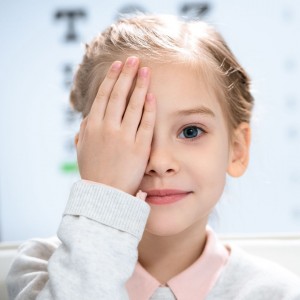Your Children and Their Eyes
 If you have young children, it seems you’re always worrying about something. When do I need to get immunizations? Are they developing appropriately to their age? What’s up with those friends? It’s a veritable worryfest at times.
If you have young children, it seems you’re always worrying about something. When do I need to get immunizations? Are they developing appropriately to their age? What’s up with those friends? It’s a veritable worryfest at times.
Eye care is kind of a fuzzy area. If it seems your child sees just fine, many parents opt to forgo pediatric eye exams, paying more attention to issues like vaccinations and fighting off things like ear infections.
But pediatric eye care is very important because early detection is the key to successful prevention or treatment of issues with your child and his or her vision.
Heading into Halloween, the last thing your little ghoul or goblin is thinking about is an eye exam. But you may be wondering about it, so here are some tips for caring for your child’s eyes from the team at Millennium Park Eye Center, where Dr. Nathalie Azar is our specialist in pediatric ophthalmology.
When should my child have a regular eye exam?
Many parenting books don’t really address eye exams. They cover when to go to the dentist and the doctor but can have a hole with pediatric ophthalmology. But eye exams are very important because vision issues will hamper your child at school if they aren’t addressed. Plus, if the issues are more serious, they can lead to permanent vision damage. Research shows that up to 10 percent of all preschoolers and one quarter of school-aged children in this country have vision problems.
So, when should you get your child to Millennium Park Eye Center for an initial exam? The American Optometric Association recommends that infants should have their first comprehensive eye exam at 6 months of age. After that, the next eye exam (if everything looked good during the first exam) should be at age 3, and then again just before the child enters kindergarten (around age 5 or 6).
What problems arise in school from vision deficiencies?
Of course, it’s obvious that eye exams are critical to catch any serious eye condition early in children. Conditions such as pediatric cataracts can’t be left to develop. But even issues such as nearsightedness can create learning problems. Children use a variety of visual skills when they are learning. If their vision can’t keep up (for instance, if they can’t see the board adequately), the child can fall behind in school.
These are the visual skills children need to learn properly:
· Distance vision
· Near vision
· Binocular eye skills
· Eye movement skills
· Focusing skills
· Peripheral awareness
· Eye/hand coordination
As we pass the spookiness of Halloween, is it time for us to see your child for his or her eye exam? Call us at Millennium Park Eye Center, (312) 996-2020, to make your appointment.
Category:


